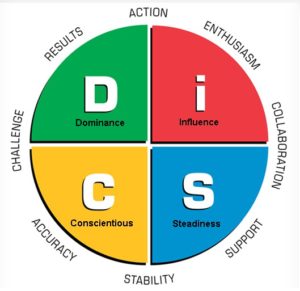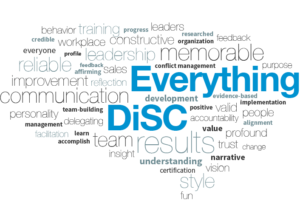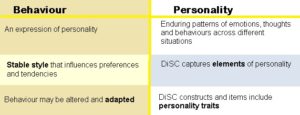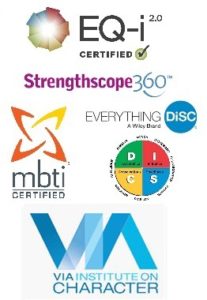What is DiSC?
- Is your behaviour more “Dominant”? Are you results-driven and orientated to action? A direct speaking, no nonsense big-picture person?
- Or are you a “Steadiness” fan? Keen to ensure everyone feels valued and supported. Reflective and calm?
- Perhaps you are all about “Conscientiousness”? Working from a logical fact-base of statistics, and insisting on accurate reporting at all times.
- Of course you might be an “Influencer” – the cheerleader of the organisation, full of enthusiasm and keen to get going on projects as a big happy team?
It’s also possible that are  you are a blend of the above, and have a strong preferential leaning to two or even three areas.
you are a blend of the above, and have a strong preferential leaning to two or even three areas.
Once we see our own behaviour preferences, and understand the differences between us, suddenly we can see the causes behind all those frictions and difficulties in understanding people who simply have different behavioural strategies and preferences.
Everything DiSC is an approach to understanding our behavioural types and preferences that has been used for many tens of thousands of organisations around the world.
DiSC supports the development of the entire workforce – individuals, teams, managers, leaders and sales people.
Unlike many personality profiling tools, DiSC is designed to be accessible for the non-technical, general audience (rather than the more clinical, industrial or academic audiences). It is very accessible and the way it is written in clear English that means it is highly useful to anyone who wishes to understand themselves or their team better.
Using Big Results Training as your facilitators, DiSC can become even more powerful, as it engages with the individuals and teams involved.
Reasons to use DiSC
Adaptive Testing at the point of questionnaire, means a thorough and accurate assessment
Easy to understand and apply in a working environment
in a working environment
Comparison reports and profiles, to highlight similarities and differences, improving relationships and performance
Engaging and interactive training/facilitation sessions enables everyone to gain a greater understanding of each other.
About DiSC
DiSC measures tendencies and priorities, not skills or ability. It is an excellent route to develop greater Emotional Intelligence in individuals and teams.
DiSC offers a wide variety of options:
- Workplace
- Management
- Work of Leaders
- Sales
- 363 for Leaders
- Five Behaviours of a Cohesive Team and Progress reports.
It also includes supplementary reports where appropriate – eg: group culture reports, comparison reports, Team view.
With skilled facillitation we can work on exploration of behaviours and how those behaviours are driven. Together we can build vision and alignment to team and leadership values.
Behaviour V Personality
It is generally agreed that our personality is fairly fixed by the time we are around 20 years of age. However our behavours are a reflection of our personality and they can change – particularly when we become more aware of them, and how they are affecting others.
So by understanding how our behaviours are manifesting themselves and how they are being seen by others with different behaviour traits and personality styles, we can change our behaviours to become more effective. DiSC can support and enhance the adaptability, ensuring we get the best out of every situation.

DiSC Can work across and together with MBTI, as there are clear routes where they intersect.
Five Behavours of a Cohesive Team
Based on a leading work around teams, by Patrick Lencioni, entitled the “Five Dysfunctions of a Team”, and the work of DiSC, a specific product to create better, higher-performing teams has been created. The facilitation programme works to create greater cohesion in a team through a pyramid model, including Trust, Conflict Management, Commitment, Accountability and Results.

Big Results Training can facilitate your team with assesments (DiSC based) on individuals then blending these with Team Surveys and Team Culture. Together, using a facilitation and training model, the team profiles and scores are assessed to identify which areas need improvement.
The Five Behaviours of a Cohesive Team work doesn’t finish at a few facilitated sessions. We create a roadmap and follow-ups, with opportunities to measure progress and ensure that everyone is involved and engaged in creating the team cohesion.


